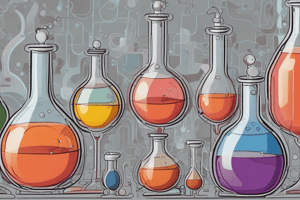Podcast
Questions and Answers
Liquid-liquid extraction is also known as ______ extraction
Liquid-liquid extraction is also known as ______ extraction
solvent
Solutes are separated based on their different solubilities in different ______
Solutes are separated based on their different solubilities in different ______
liquids
The process of liquid-liquid extraction is suitable for thermally ______ and high-boiling compounds
The process of liquid-liquid extraction is suitable for thermally ______ and high-boiling compounds
labile
An organic ______ is added to the aqueous solution containing solutes in liquid-liquid extraction
An organic ______ is added to the aqueous solution containing solutes in liquid-liquid extraction
Compound A is soluble in ______ and insoluble in water
Compound A is soluble in ______ and insoluble in water
Study Notes
Liquid-Liquid Extraction
- Liquid-liquid extraction, also known as solvent extraction, is a separation process that involves the transfer of a solute from one solvent to another, with the two solvents being immiscible.
Separation Principle
- Separation is based on the different solubilities of solutes in different liquids.
- The original solution is transferred to another liquid solution, separating the substances that constitute the original solution.
Advantages
- Simple process
- Low cost
- Suitable for thermally labile and high-boiling compounds
Disadvantages
- Time-consuming process
- Tedious
- Environmental concerns
Liquid-Liquid Extraction Steps
- Add an organic solvent to an aqueous solution containing solutes, forming two immiscible layers.
- Mix the layers by moderately shaking, then stop the process for a few minutes to allow the layers to separate.
- Separate the layers.
Separation Using a Separation Funnel
- Can be used to separate immiscible liquids.
Example: Separation of Organic Compound A and Inorganic Salt B
- Compound A is soluble in ether and insoluble in water.
- Compound B is soluble in water and insoluble in ether.
- Steps for separation:
- Add ether to the mixture containing A and B, forming two immiscible layers.
- Mix the layers, then stop the process to allow separation.
- Separate the ether layer containing A from the water layer containing B.
Studying That Suits You
Use AI to generate personalized quizzes and flashcards to suit your learning preferences.
Description
This quiz covers the concept of liquid-liquid extraction, a separation process that transfers solutes from one solvent to another. It involves the transfer of solutes based on their different solubilities in different liquids.




